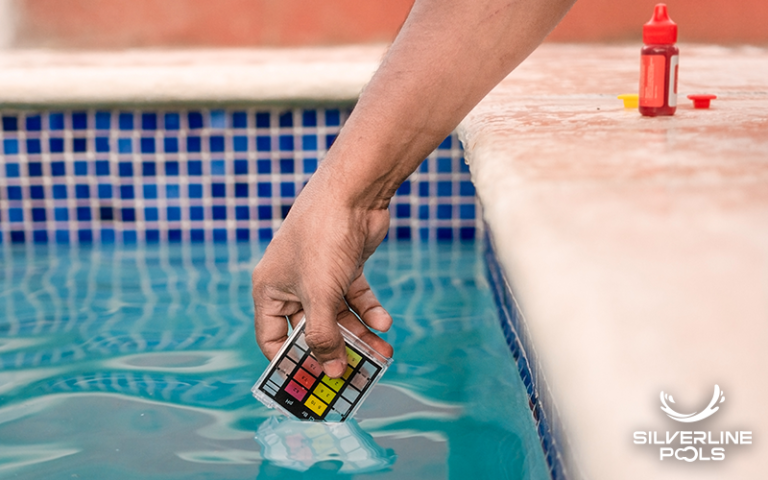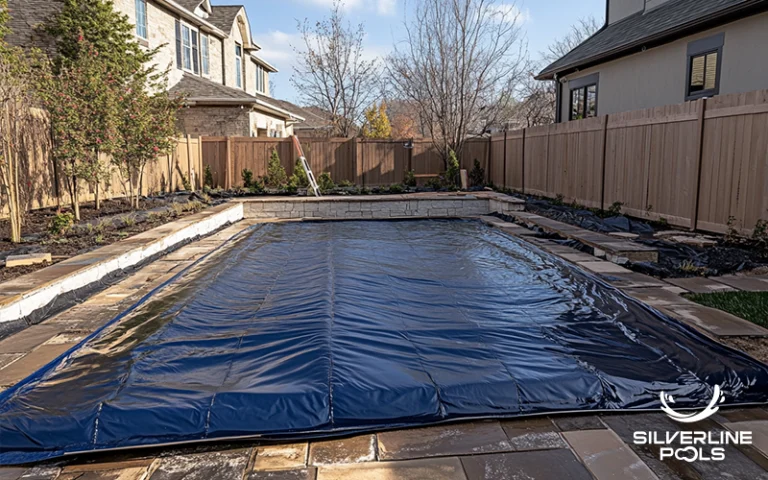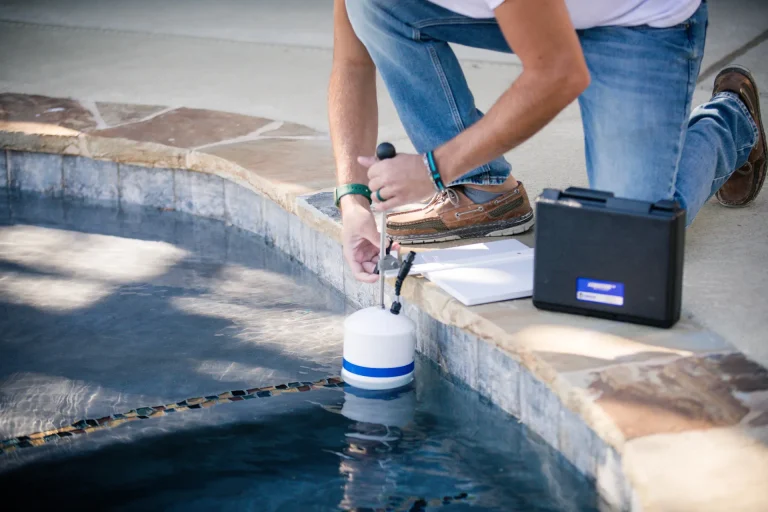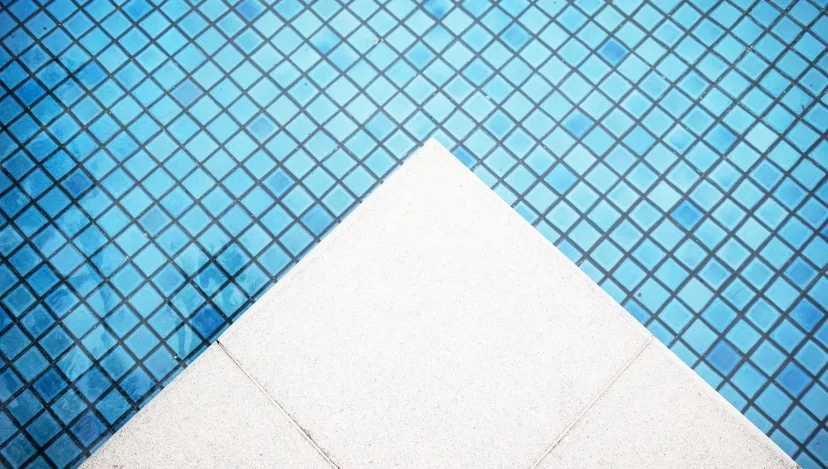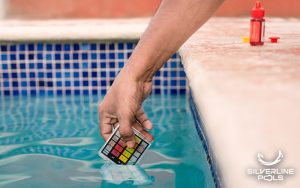Pool tiles and regular tiles are different. Pool tiles have their pool-related benefits while regular tiles are mostly used as hardscaping for bathrooms and other home and commercial spaces. Most of the people might use regular tiles in their pools, compromising pool appeal and safety. So, the burning question is: “How are pool tiles different from regular tiles?”
This blog explores everything about a regular tile vs, pool tile. It explains the key differences between them to help pool owners choose the right one.
Let’s jump in!
What are pool tiles?
Swimming pool tiles are specifically engineered for use in swimming pools. They are usually constructed with ceramic tile, porcelain, or stone.
What are regular tiles?
Regular tiles, including bathroom tiles, are utilized for various indoor and outdoor purposes, such as kitchen and bathroom floors and walls. They are composed of ceramic, porcelain, stone, glass, metal, or wood.
What are the differences between pool tiles and regular tiles?
Here are the critical differences between pool tiles and regular tiles based on various factors:
- Material Used
- Durability and Lifespan
- Function
1. Material Used
Pool tiles are typically constructed of porcelain, glass, or natural stone, creating a clean and bright appearance for the pool.
Regular tiles are manufactured from ceramic, porcelain, or other materials that may not be suitable for the pool’s wet and harsh environment.
Traditional 6” x 6” porcelain tiles have been commonly used for the swimming pools’ waterline area. However, glass mosaics, known for their timeless aesthetic and potential for an unlimited lifespan, have gained popularity recently.
2. Durability and Lifespan
Pool tiles are designed to withstand harsh exposure to the pool environment and outlast regular tiles in durability.
They are resistant to water, chemicals, and temperature fluctuations, boasting greater durability and a longer lifespan than regular tiles.
In contrast, regular tiles don’t possess the same level of longevity and may necessitate additional upkeep to maintain their optimal appearance.
3. Function
Pool tiles serve both functional and aesthetic roles in swimming pools, contrasting with regular tiles, which cater to aesthetic and protective needs in interior and exterior spaces.
The blue tiles around the waterline create a finished look, protect the pool structure, and prevent a yellow ring caused by body oil, sunscreen, and other substances.
Regular tiles, on the other hand, are often used for decorative purposes in spaces like kitchens and bathrooms. They can also provide a non-slip surface in areas where safety is a concern, such as shower floors or entryways.
Pool Tile vs Regular Tile: which one is right for your pool?
Let’s narrow down our discussion about choosing between regular and pool tiles for your backyard pool. Choosing between the pool tiles and regular tiles for your pool flooring depends on your choice.
However, the table below shows a comparison to help pool owners choose the best pool option for their pools:
| Features | Pool Tiles | Regular Tiles |
| Best Suited For | Swimming pools and Swim Spas | Kitchens, Bathrooms, Indoor Flooring, Custom Space Flooring, etc. |
| Durability | Resistant to pool chemicals | Deteriorate in pool chemicals |
| Maintenance | Require low maintenance and cleaning | Prone to staining and frequent cleaning |
| Safety | They have an anti-slip texture for the swimmers’ safety | They can be slippery |
| Costs | High upfront costs | Low initial costs |
| Aesthetics | Offer limited aesthetic options in the design. | Highly customizable with their designs, styles, beautification elements, etc. |
What are the sizes of pool tiles?
The following are the different sizes of pool tiles:
- Small Size Pool Tiles: 20×20 cm and 30×30 cm.
- Medium Size Pool Tiles: 45×45 cm or 60×60 cm.
- Large Size Pool Tiles: 80x80cm or bigger and 30×120cm.
What are the pros of pool tiles?
As the name indicates, these tiles are designed for the pool environment. The pool environment is different and harsh compared to the regular tiles, so it is always best to choose specific pool tiles.
The pros of having pool tiles include the following:
- Easy cleaning
- Resistance to mold and pool chemicals
- Durability of the material
- Decorative elements
- Ensures the swimmers’ safety
What are the cons of pool tiles?
Some of the downsides of pool tiles include:
- Costly option than regular tiles
- Tricky installation; always requires professional installation techniques
- They can be rough due to their anti-slip texture
What are the different sizes of regular tiles?
The available standardized tile sizes in the market are:
For Floors
300mm X 600mm
600mm X 600mm
610mm X 610mm
800mm X 800mm
For Walls
250mm X 300mm
300mm X 450mm
300mm X 600mm
What are the pros of regular tiles?
Here are some of the pros of swimming pool flooring with regular tiles:
- Regular tiles are budget-friendly
- Wide variety of colors, patterns, finishes, and materials.
- Their installation is DIYable.
- Regular tiles give a fresh and highly aesthetic look to the pool.
- They are smoother than pool tiles.
What are the cons of regular tiles?
The cons of regular tiles are:
- Regular tiles fade, crack, chip, or detach from the pool surface.
- They are sensitive to pool chemicals.
- They are slippery.
- They are not durable options.
Silverline Pools: Your Best Pool Services Company
Silverline Pools is your best choice for pool-related services. For almost 30 years, we have excelled in providing top-notch pool maintenance, repair, and poolside landscaping services. Our landscaping ensures your pool gets the sophisticated water and fire features, decking, and tiling it deserves.
Our expert pool designers and installers professionally install your pool tiling to guarantee a long-lasting effect. We provide top-quality and aesthetic pool tiles to elevate the longevity and aesthetics of your pool flooring.
Can you use bathroom tiles for pool flooring?
Bathroom tiles and pool tiles are different in their function. Using bathroom tiles in the swimming pool is not a good option. This is because bathroom tiles are not resistant to pool chemicals, temperature, and sunlight exposure. These pools may fade and deteriorate in the pool water conditions.
What type of tile is best for swimming pools?
Porcelain or Ceramic are the best tile options for swimming pools.
Do you need specific grout for pool tiles?
The ideal choice for pool tiles is the grout with high waterproof and adhesive qualities. Epoxy grout is the best choice for pool tiles because it’s durable, waterproof, and requires no sealing.
What is the range of pool tile thickness?
The thickness of pool tiles ranges from 9 mm to 20 mm.
Can you tile over pool tiles?
It is possible to tile over existing pool tiles. However, this is not a durable method, and it may create issues with tile coping and adhesion.
Final Thoughts
Pool tiles are great additions to your pool flooring. They not only beautify the pool but also enhance its lifespan. Choosing the best tile for your pool is crucial.
Most owners might wonder about selecting between pool tiles and regular tiles for their backyard entertainment hubs. The simplest answer is that pool tiles stand out more than regular tiles.
Pool tiles require great care and precision during installation. Fortunately, Silverline Pools’ expert designers and installers make it easy for you. Contact their crew and prepare for a pool tile installation with extensive attention to detail and laser-focused precision.


